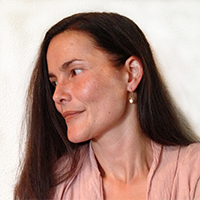Tom Howard/Margaret Reid Poetry Contest 2018
Congratulations to the winners of the 2018 Tom Howard/Margaret Reid Poetry Contest!
Honorable Mention $100
- McKayla Conahan, The New Sentimentality, Poetry
- Jen Stewart Fueston, Trying to Get My Body Back, Poetry
- Simon Lewis, Man Talk, Poetry
- Kathleen Lynch, Yard Work, Poetry
- Lena Khalaf Tuffaha, Lemon Blossoms, Poetry
- Wes Civilz, The Barrio, Traditional Verse
- Brooke Harris, Robeson County, North Carolina, 1993, 1939, Traditional Verse
- Belle Ling, Grass Flower Head, Traditional Verse
- Matt W. Miller, Augumtoocooke, Traditional Verse
- Tim Slade, Teacup of the Rose, Traditional Verse
Judge Soma Mei Sheng Frazier comments on the winning entries
A friend once divulged that what he enjoys most about reading poetry is the voyeuristic thrill: the opportunity to pore over a page that clearly cannot stare back at him. At the time, I nodded in assent—but as final judge of 2018's contest, I've gained a starkly different perspective.
Last year's 3,895 submissions tapped into a vast reservoir of discernment. Many were incisive; some, downright indicting. I was humbled by the opportunity to read them and find that their pages were not blind or blasé.
These poems were woke, and would not let me sleep. Eyes wide, laptop glowing back at me in the dead of night, I came to know a woman who laughed "louder than Jim Crow's law & cried softer / than God's peace." I learned that hatred looks like a mouth, and that "one handful / is the most sacred unit of volume."
The poems I chose reflect the new sentimentality's fascination with purging. Conversely, they acknowledge that men talk of "curries made with mackerel, / children they only see at weekends, / the hope of returning home for good." I've learned the secrets that the earth swallows under Carolina pines, and that "the distance / between shame and pride is so mutable we use / both words for the same thing: / She has no shame. She has no pride." I've learned to conjugate the verb saar; that a "body might think it's a wardrobe, larger inside than out"; that there's no seeing Augumtoocooke anymore, though it is possible to love my lover as I love my city. I've learned that the card of a mariner's compass is called a rose, and that 豆 grows 艹 in the rain.
Finally, after reading and rereading—witnessing, wondering, weighing—I've come to understand that the most skilled, distilled poetry offers no kitsch and no simple comfort: no empty glass ornamentation or overstuffed pleather recliner designed to absorb and return one's own warmth. The most powerful pages are discomfiting. Assertive. Observant. They see us more clearly than we see them. I hope you will agree.
The Winners
"Mama Was a Negro Spiritual" by Latorial Faison
Tom Howard Prize for verse in any style
Sometimes a poem's title overpromises. Not so for this fervent ode, resonant with internal rhyme and reason, which instead builds stanza by stanza to an ending both inexorable and unpredictable. Like prayer, like faith, like devotion, this poem focuses its adherents on what is essential and meaningful: "a wisdom no man could whistle, a fancy no woman could fake, a journey nobody living in the now could take." Amen.
In addition to her cash prize, Ms. Faison also received a one-year gift certificate from our co-sponsor, Duotrope (a $50 value).
"Villanelle for the Wound" by Sean Patrick Mulroy
Margaret Reid Prize for verse that rhymes or has a traditional style
In Italy, where the term villanella originated—indicating a song sung by a villano, or peasant—there were no rigid guidelines limiting these rustic melodies to nineteen seven-syllable lines with two rhymes and two refrains. Nor did the French Renaissance poets who dubbed their work "villanelles" restrict themselves in form. It was the popularity and emulation of Jean Passerat's work that created the poetic contortionism practiced to this day. But sometimes, a skilled craftsman surpasses apprenticeship to reveal himself as a master, paying homage to institutionalized traditions by advancing them. So as you read, take note of how the echoing, evolving imagery in "Villanelle for the Wound" leverages repetition without redundancy, structure without stricture. Take note of the poem's distinct shape on the page—the quatrain's final line ghosting forth as a sparse monostich. Like a ghost, the line is full of white emptiness. Like a ghost, this haunting poem will inhabit you.
In addition to his cash prize, Mr. Mulroy also received a one-year gift certificate from our co-sponsor, Duotrope (a $50 value).
Honorable Mentions: Tom Howard Prize
"The New Sentimentality" by McKayla Conahan
"The New Sentimentality" is a snapshot of modern life that peels back to reveal something sacred. Amid references to cutoff denim booty-shorts, Marie Kondo, browser bookmarks, and emo music, something "untranslatable" is translated; something immeasurable rationed out by a poet wiser than their years.
"Trying to Get My Body Back" by Jen Stewart Fueston
This is a poem to read once silently, once aloud (eschewing the opinions of smirking strangers in the café) and several more times, either way. Then, we will understand how theft can be bestowal—how extraction can be expansion; annexation, unification; and rending, an uncanny respawning.
"Man Talk" by Simon Lewis
Crammed in the back of a Volkswagen Passat between "lads of size and silence", crossing the beach, watching the sea, the speaker of this poem does not speak—but fishes unobtrusively. Follows suit. And soon, the speaker's restraint is rewarded: unsaddled by expectations—undistracted by frivolous conversation—the men fish for us. We watch the sea, the waves, the bobbing line. And soon, we are rewarded with our catch.
"Yard Work" by Kathleen Lynch
If we are lucky, there is something tenacious in us that wraps its roots around whatever will nourish and stabilize. And when that something breaks the surface, unearthed and blossoming into action, we stand in awe. "Yard Work" captures the shame/pride of a desperate and resolute act; the mystery of a parent viewed by a child or recalled by an adult; the human need to spark light in a dark season. Ms. Lynch previously received an Honorable Mention in our 2011 Wergle Flomp Humor Poetry Contest for "Soaps Fan".
"Lemon Blossoms" by Lena Khalaf Tuffaha
There is a difference between "I am" and "I became," just as there is a difference between alone and abandoned, destitute and displaced, brittle and besieged. In seven short stanzas, the speaker of "Lemon Blossoms" parses this distinction—linguistically, culturally, historically, viscerally—by allegorically inflecting the word saar, a variant of the past tense.
Honorable Mentions: Margaret Reid Prize
"The Barrio" by Wes Civilz
"To love your lover as you love your city," this Shakespearean sonnet begins, taking us by the hand and pulling us along on an intimate walking tour. It's noon, our guide patient and permissive, so we touch the barrio's swaying palm; we pause at her temple to worship. Later, passing beneath the familiar kitchen of her mind, we catch the scent of smoldering herbs. We inhale, too, the sense of ownership that permeates any longtime resident—until, inevitably, we take a swift turn. And there, in the volta, we're disoriented: left to spin on the sidewalk for a moment, lost in the city that we love.
"Robeson County, North Carolina, 1993, 1939" by Brooke Harris
While contrapuntal music creates a harmony from two distinct melodic lines, "Robeson County", a skillful example of contrapuntal poetry, weaves two poems into a third. Disparate experiences share a single setting: Robeson County, North Carolina, where the specters of 1939 bump up against adventurous campers hiking deep into the back woods toward a pit of cool, rich mud.
"Grass Flower Head" by Belle Ling
Uncle Ming sells his tofu in the market. It is raining in Hong Kong as we write Chinese characters in unison with our exacting teacher—one stroke after another. And as the impressionistic painter Camille Pissarro once advised, "Grass Flower Head" uses quick strokes too, revealing itself "generously and unhesitatingly"; offering parable, pictograph, rhythm, and a protean meal on a red square tray. (While concrete poetry has solidified in many minds as poems with recognizable shapes, the form actually remains as moldable as a fresh slurry of aggregate, cement paste and water—its defining aspect being the simple fact that much of its significance would be lost were one to hear it read aloud rather than viewing it on the page.)
"Augumtoocooke" by Matt Miller
The ghazal, which illuminates the endurance and rewards of some form of unrequited love, traditionally deals in loss and separation. To these, "Augumtoocooke" adds colonization, industrialization and appropriation. Thus the ancient, demanding ghazal form is stripped naked in this poem—the desperate thirst of unconditional love, and the arrogance inherent to its persistence, laid bare.
"Teacup of the Rose" by Tim Slade
It's not every day that a poem of rhymed couplets, infused with traditional imagery and symbolism, intoxicates the modern reader. But the delicate heirloom "Teacup of the Rose" serves up aroma and alchemy; triggers recognition, memory, connection. Here is a rich blend of new flavors and old knowledge—steeped in grief, sweetened with tenderness.
See the press release about the winning entries. Learn more about the Tom Howard/Margaret Reid Poetry Contest.
Contest Judges

Soma Mei Sheng Frazier
Soma Mei Sheng Frazier is the final judge of our Tom Howard/Margaret Reid Poetry Contest. Soma's third prose chapbook, Don't Give Up on Alan Greenspan, was selected as the winner of CutBank's 2018 contest and released in 2019. Her previous fiction chapbooks—Salve (Nomadic Press) and Collateral Damage: A Triptych (RopeWalk Press)—earned praise from Nikki Giovanni, Antonya Nelson, Sarah Shun-lien Bynum, Molly Giles, Michelle Tea, and others. In 2015 she founded COG, a multimedia literary publication that she ran with her undergraduate students at Cogswell, which has featured Dave Eggers, Opal Palmer Adisa, Gish Jen, Denise Duhamel, and many more. Read this selection of poems and listen to her read with other Nomadic Press authors on KPFA 94.1 FM. Read Soma's brief Glimmer Train essay on literary craft.
Soma recently relocated from California to New York for a professorship at SUNY Oswego. Her sweet tooth demands sugar in everything but literature. She is now busy revising a novel.
Contest Judges

Jim DuBois
Jim DuBois assists with the judging of our Tom Howard/Margaret Reid Poetry Contest and previously with our North Street Book Prize. He studied writing and computers at Hampshire college. Now he spends his time inventing games, writing poetry and making art.









